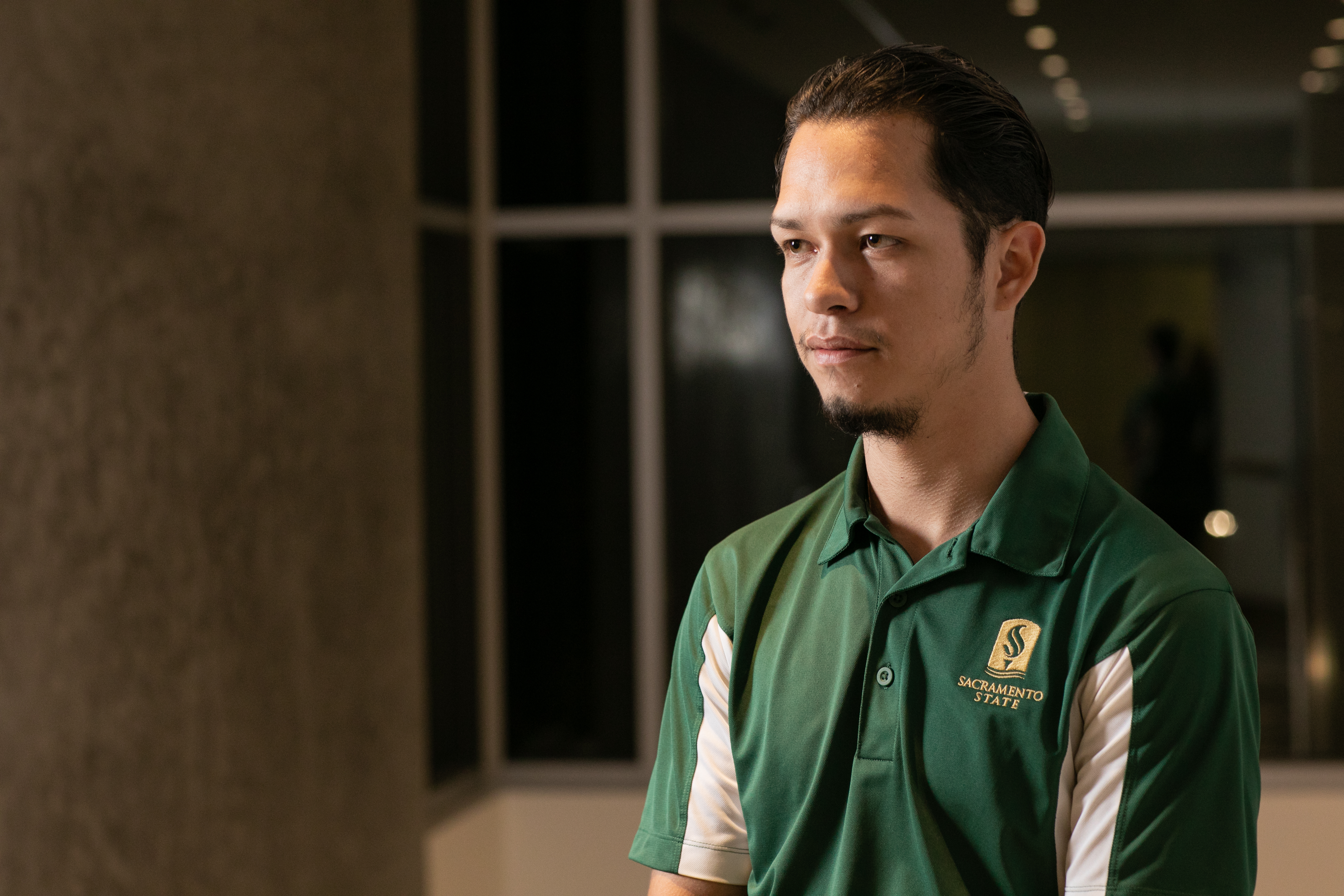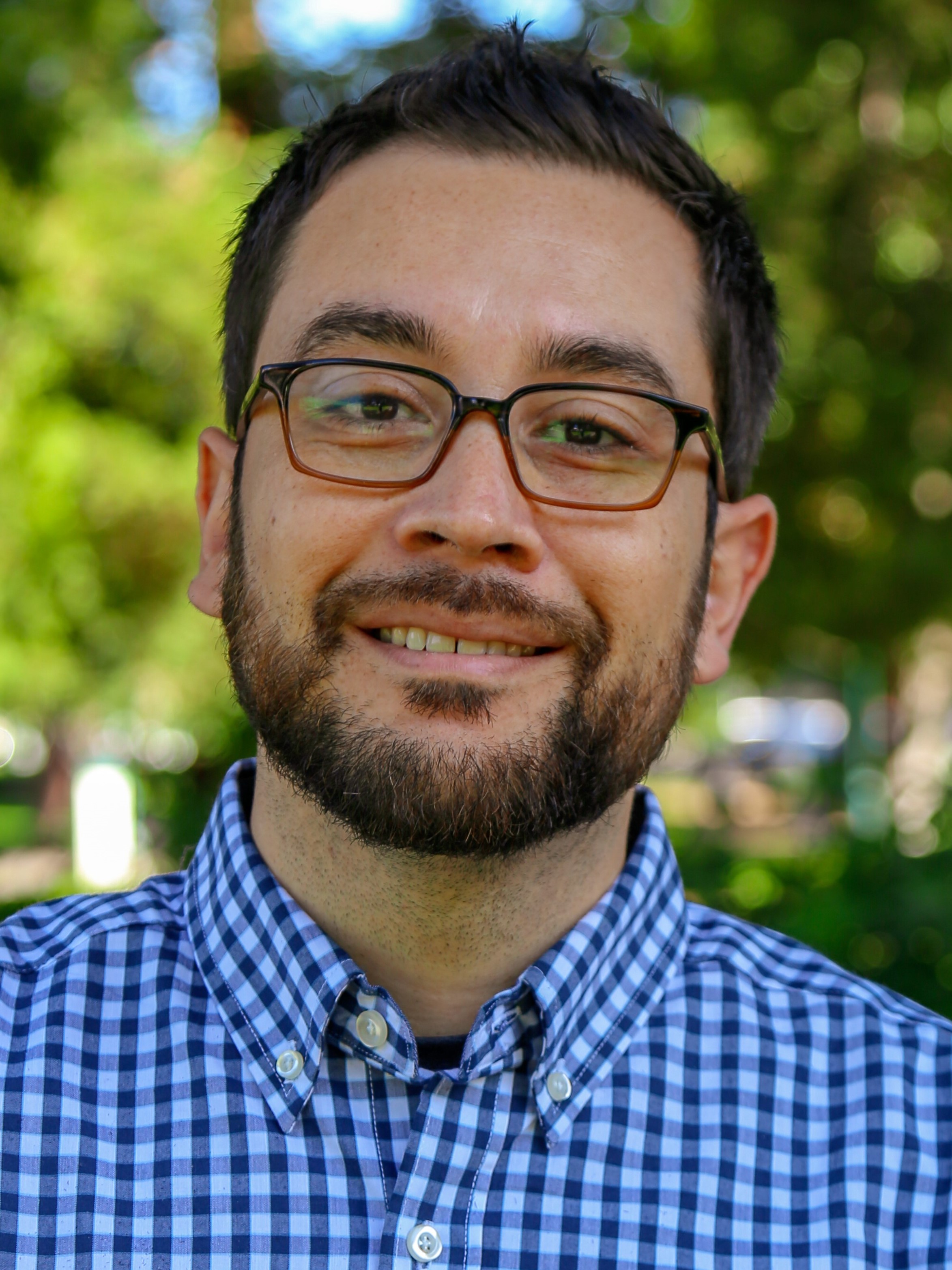 Communications major Israel Flores, one of the hundreds of undocumented students attending Sac State, says uncertainty over the fate of DACA has created an environment in which "I live day to day" while trying to maintain focus on his studies. (Sacramento State/Andrea Price)
Communications major Israel Flores, one of the hundreds of undocumented students attending Sac State, says uncertainty over the fate of DACA has created an environment in which "I live day to day" while trying to maintain focus on his studies. (Sacramento State/Andrea Price)
By Cynthia Hubert
Born in Mexico and undocumented in the United States, his adopted country, Israel Flores is on track to get his undergraduate degree from Sacramento State in the spring.
But his mind is reeling with concern. Will he be allowed stay in the U.S. and turn his education and degree into a career here?
As the U.S. Supreme Court debates whether to end Deferred Action for Childhood Arrivals, or DACA, Flores and hundreds of other undocumented Sac State students are on edge. The University and CSU have pledged their support to DACA students, widely known as Dreamers, but they live, work and study with increasingly uncertain futures.
“I try not to think too much about it, because I really want to focus and finish and then start my career,” said Flores, a senior Communications major who also serves as vice president for Academic Affairs for Associated Students Inc., the University's student government. “I live day to day, because I just don’t know what’s going to happen with DACA.”
 Erik Ramirez, coordinator of Sac State's Dreamer Resource Center, has first-hand experience living with the uncertainty about how the U.S. Supreme Court will rule on the Trump administration's challenge to DACA. (Photo courtesy of Erik Ramirez)
Erik Ramirez, coordinator of Sac State's Dreamer Resource Center, has first-hand experience living with the uncertainty about how the U.S. Supreme Court will rule on the Trump administration's challenge to DACA. (Photo courtesy of Erik Ramirez)Under the program, undocumented immigrants who were brought to the United States before age 16 and who meet other strict criteria are protected from deportation proceedings and are eligible to work and study in the country. DACA does not, however, provide a clear path to citizenship.
Students such as Flores could be banished from the country that they consider home if the Supreme Court rules that President Trump may permanently rescind DACA, which has covered more than a million undocumented residents in the U.S. since its inception in 2012.
The possibility weighs heavily on Erik Ramirez, coordinator of Sac State’s Dreamer Resource Center, which provides undocumented students with academic and financial resources as well as legal and emotional support.
The center, one of the first of its kind in the country, launched about four years ago and helps hundreds of students navigate the academic, legal, and personal ramifications of their undocumented status. Sac State estimates that 700 to 900 undocumented students, many of them DACA recipients, attend the University.
“There is a lot of fear and uncertainty right now,” said Ramirez, who also is undocumented and in the U.S. under DACA. “They’re wondering, ‘If DACA goes away, can the government come after me? They have all of my personal information. They know that I am here.’ ”
For years, young immigrants have lived with worries about their future in the U.S. News emanating from the Supreme Court justices' response to oral arguments made before them in early November have only inflamed those concerns, Ramirez said.
“I’m focused on students, so I don’t spend every waking second worrying about the fact that I’m undocumented,” said Ramirez, 34, who recently finished his master’s degree and has applied for DACA renewal. “But do I ever forget about it? No. It’s always in the back of my mind.”
Sac State offers undocumented students on campus and in the community options for dealing with concerns relating to their immigration status.
The Dreamer Resource Center reaches out to inform educators, students and their families about options for pursuing college despite their undocumented status, Ramirez said. The center offers workshops, policy briefings, panel discussions and a yearly conference to provide information and foster support for undocumented students. The campus also provides direct services to affected students, including weekly legal clinics focusing on immigration issues and a seminar designed to help students succeed despite their undocumented status.
Every week, dozens of young immigrants walk into the Dreamers Resource Center with questions and concerns, Ramirez said.
“This semester we are seeing the highest number of students I’ve ever seen,” he said.
Many of those students have on their minds the Supreme Court’s upcoming decision on DACA, expected no later than June 2020.
California State University and University of California have pledged continued support for undocumented students as they await the court's ruling.
“We remain committed to ensuring that all CSU students have the opportunity to pursue their higher-education goals regardless of their country of origin,” Chancellor Timothy P. White said earlier this year. “This inclusive foundation extends to our employees, who demonstrate their dedication to student achievement and success on a daily basis.”
UC is one of the key plaintiffs in the lawsuit. Sacramento State is among 165 universities and colleges from across the country that signed onto a legal brief supporting DACA recipients.
“American institutions of higher education benefit profoundly from the presence of immigrant students on our campuses,” the brief reads. “This misguided, arbitrary and capricious decision will harm the thousands of remarkable young people who are already DACA recipients and millions more who would seek to take advantage of the opportunities that DACA provides. Critically, it will also harm the country, which will be deprived of the many contributions Dreamers would otherwise be able to make.”
Every student at Sac State is "equally important," said President Robert S. Nelsen.
"We recognize that this is a time of significant fear for our undocumented students, and I want to reiterate that our students are safe here," Nelsen said. "Sacramento State cares about you. I care about you."
Flores hopes one day to be a legislator or an attorney, “anything having to do with the law,” he said. But he is more aware than ever that his future in America is precarious.
“Right now, it’s really uncertain what is going to happen, so it’s hard to plan for the future,” Flores said. “I’ve put so much work into school, and I’ve helped my sister go to school. I’ll have a degree soon, but will I be able to use it? I just don’t know.”
